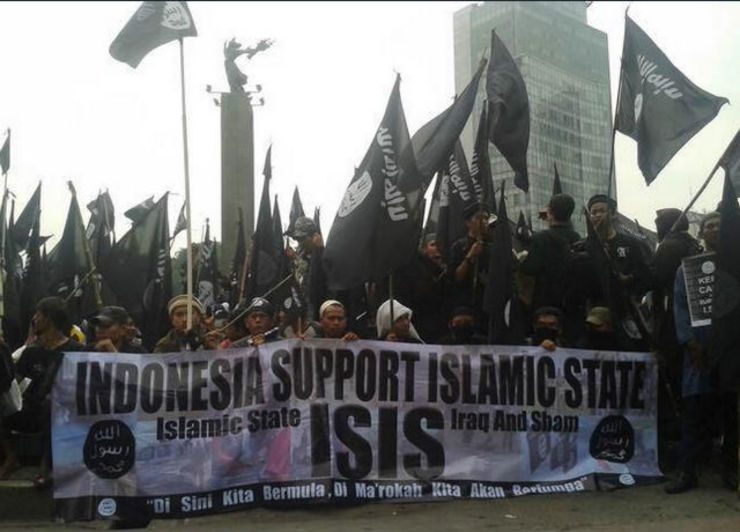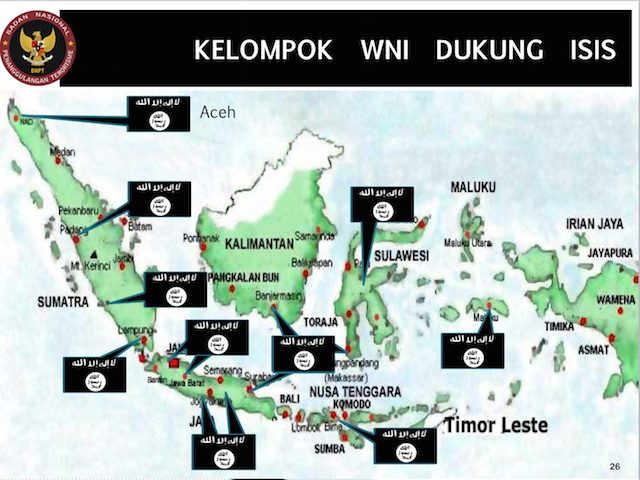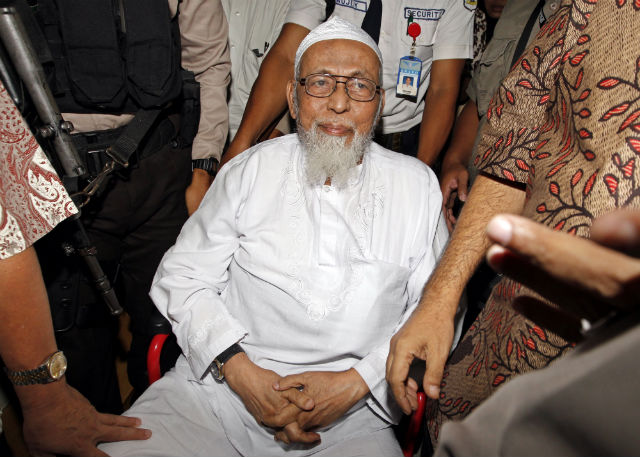SUMMARY
This is AI generated summarization, which may have errors. For context, always refer to the full article.

JAKARTA, Indonesia – One day in late December 2014, 38-year-old Amin Mude was sitting in the Jakarta Police station, telling a local reporter about why he was helping Indonesians travel to Syria to join the Islamic State (ISIS).
“I am just helping people to go there so that they can be better Muslims,” he told The Jakarta Post.
Amin bragged about having helped send 10 Indonesians to Syria in September 2014, and said he would like to relocate and wage jihad too. In fact, he was in jail at the time because police suspected his involvement in the failed attempt of 6 people from Makassar to travel to Syria.
Despite this, police released him a day after. The 6 Indonesians caught claimed they were going to Syria for economic purposes and not to join ISIS, and the most police could charge Amin with was document forgery for helping falsify passports.
On Saturday, March 21, police arrested Amin again. They believe he helped recruit and make fake passports for 16 Indonesians caught by Turkish authorities trying to cross the border into Syria.
“They clearly wanted to go to Syria for jihad purposes, as 10 of them are from East Java and are relatives of Achsanul Huda and M. Hidayah,” a source from the National Police anti-terrorism unit Densus 88 told Rappler.
M. Hidayah was one of the terrorists shot down by Densus 88 in Tulungagung, East Java, in July 2014. He, and his colleague Riza, were a part of the jihadist network in Poso, Central Sulawesi.

Should they have let him go the first time?
The police now believe they can charge Amin under the 2013 Law on Terrorism Funding, but this raises the question: Would it have been better if police were already able to detain him back in December?
If that were the case, he wouldn’t have been able to recruit and send more Indonesians to Syria. The worry is that these Indonesians could return, hardened and trained in ISIS ways.
Amin, in fact, is just one example of a known ISIS supporter who Indonesian police have had a hard time putting behind bars.
Another one of those arrested on March 21 was Muhammad Fachry, the editor-in-chief of the extremist website Al Mustaqbal, which had been actively translating and disseminating articles that support and defend ISIS. He is also one of the founders of the Forum of Islamic Law Activists (FAKSI), whose members have gone to Syria, according to the Institute for Policy Analysis and Conflict (IPAC).
“As of late September, however, M. Fachry continued to openly preach support for ISIS,” IPAC wrote in its report, Evolution of ISIS in Indonesia, which was published in September 2014. “As someone who has never committed a violent act, hid fugitives or possessed weapons, he is difficult to prosecute under Indonesian law.”
If Amin and Fachry were in Singapore, authorities would have been able to put them under lengthy preventive detention without trial under the Internal Security Act. But is this where Indonesia wants to go?

Stronger laws needed
The government of the most populous Muslim-majority country in the world has made strong pronouncements against ISIS, saying it’s banned in Indonesia, but in reality they have few practical tools to actually do this. (READ: Indonesia bans ISIS, fights it on various fronts)
“Indonesia does need a number of stronger laws to enforce its commitment to banning ISIS. For example, at present it is not illegal for Indonesians to travel overseas to take part in military training, and it should be,” the IPAC report stated.
Indonesia has been largely successful in combatting Jemaah Islamiyah (JI), once al-Qaeda’s arm in Southeast Asia, which was initially founded by jihadists who returned from Afghanistan.
But terrorism expert Rohan Gunaratna warns Indonesia against relying on the same tactics to combat ISIS, which is recognized to be far more dangerous than al-Qaeda and far more effective at recruiting supporters.
“Create a special legal framework to fight ISIS. You can’t use the old framework that you fought JI with. ISIS is a much more dangerous group,” Rohan said at the International Conference on Terrorism and ISIS held in Jakarta on Monday, March 23.

Danger to democracy?
Of course, the problem with coming up with stronger laws against ISIS is the risk of violating human rights.
“The problem, restated, is how to protect democracy without injuring democracy itself?,” Indonesia’s former intelligence chief, retired Gen. A.M. Hendropriyono, wrote in an undelivered speech addressed to Monday’s conference. A copy of the speech was given to conference participants.
“The actual threat posed by ISIS to our national security has become intense, such that it demands the state take steps to resolve the problem. However, there is often friction between security policy and personal freedoms,” the speech said.
Hendropriyono, whose consulting company organized the conference, has long been an advocate of a law similar to Singapore’s ISA. In 2011, he supported the controversial draft intelligence bill, which, among others, sought to give intelligence agents the authority to preemptively arrest suspected terrorists. The bill attracted so much criticism and debate that it was eventually shelved.
The former general is also seen to be a close adviser to President Joko “Jokowi” Widodo, who told The Asahi Shimbun in a recent interview that he was going to issue a presidential decree to ban ISIS in Indonesia.
Will Indonesia have to sacrifice personal freedoms to fight ISIS? Some analysts are optimistic it won’t come to that.
“[Indonesia] defeated the first wave of al-Qaeda inspired terrorism in the first decade of this century without compromising its democratic character, and I am confident that with the experience that it has gained from combatting the terrorism of Jemaah Islamiyah, Indonesia will overcome this emergent second wave of terrorism,” Angel Rabasa, a senior political scientist at the RAND Corporation, told the conference. – with a report from Ahmad Nazaruddin/Rappler.com
Add a comment
How does this make you feel?
There are no comments yet. Add your comment to start the conversation.